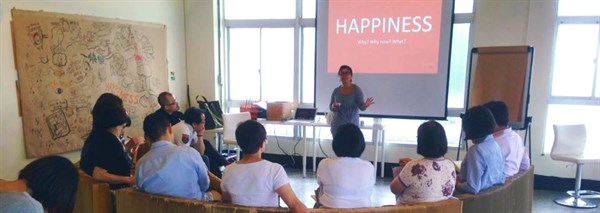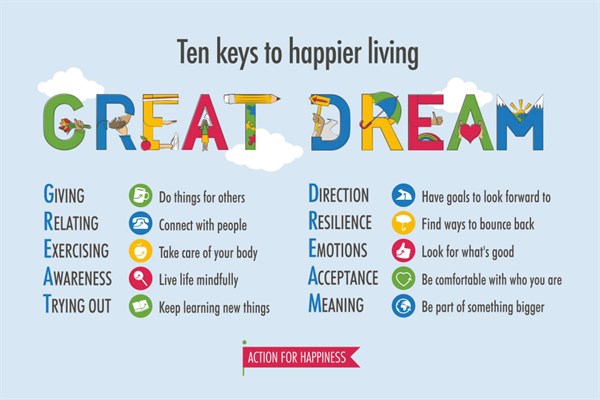This page has suggested guidelines for hosting a Happy Café
gathering. These are based on activities tried out successfully at
the first ever Happy Café in Brighton.

Hosting a successful gathering
- The hosts need to help create a safe, friendly, relaxed
and positive atmosphere. They ensure everyone is welcomed
and feels comfortable to take part in discussions, while also being
given the opportunity to "opt out" of contributing if they
prefer.
- Most people like a mixture of open discussion
(non-guided) plus some structured discussion about
Action for
Happiness and related themes.
- It can work well to give people the chance to have open
conversations in the first half of a gathering and offer a more
structured discussion for the second half, perhaps around one of
the Ten Keys to
Happier Living.
- Hosts need to ensure that people do not use the occasion to
promote their own business. If someone would like to offer a
workshop or a taster session, they should talk to the organiser to
make sure that this relates to the Action for Happiness mission and
to agree what is appropriate
- Action for Happiness badges are useful to
identify the hosts and attendees and to take advantage of any
discount at the café may offer for those wearing the badges.
- Above all, hosts should feel relaxed, enjoy the event and let
it evolve in a way that feels right. If people leave
feeling happier and more inspired to support Action for
Happiness, it has been a great success!

Detailed suggested steps
- Get there early to get everything ready.
- Reserve tables for the numbers expected and
mark the tables with Happy Café flyers.
- Bring Action for Happiness resources, e.g.
badges, postcards & guidebooks.
- Give a warm welcome to attendees as they come
in, offer them a badge if they're not wearing one and suggest they
grab a coffee.
- Start the proceedings by saying something
about the Action for Happiness movement, any local groups/courses,
and the idea behind Happy Cafes.
- Help people relax, by asking attendees to
start by take a few deep breaths.
- Let people get to know each other. Allow about
an hour for people to chat to each other and have something to eat
or drink. Getting them to share in pairs one or more good things
that have happened to them that week is a good way to break the
ice.
- Offer a structured discussion in small groups.
This could be around what makes them happy or grateful or the Ten
Keys to Happier Living (see suggested questions below).
- Encourage people to move so they don't just
talk to the same person all the time.
- Bring people into the conversation in a
friendly and encouraging way, especially keeping an eye out for
people who don't seem to be participating
- Help people stay in contact by circulating a
sheet and inviting attendees to share their contact details if they
wish to be kept informed of future gatherings.
- Bring the gathering to a close, thank people
for being there, talk about the next planned meetup and then clear
away the materials and tidy up the area.

Ten Keys Questions for Discussion

Ten Keys Action Ideas
GIVING
(Do things for others)
- Do three extra acts of kindness today. Offer to help, give away
your change, pay a compliment, or make someone smile.
- Reach out to help someone who's struggling. Give them a call or
offer your support. Let them know you care.
RELATING
(Connect with people)
- Make more time for the people who matter. Chat with a loved one
or friend, call your parents or play with the kids.
- Make three extra connections today. Stop to chat in the shop,
wave at a neighbour, learn the name of someone new.
EXERCISING (Take care of your
body)
- Be more active today. Get off a bus a stop early, take the
stairs, turn off the TV, go for a walk - anything that gets you
moving.
- Eat nutritious food, drink more water, catch up on sleep.
Notice which healthy actions lift your mood and do more of
them.
AWARENESS (Live life mindfully)
- Give yourself a bit of head space. At least once a day, stop
and take 5 minutes to just breathe and be in the moment.
- Notice and appreciate good things around you every day, big or
small. Trees, bird song, the smell of coffee, laughter
perhaps?
TRYING OUT (Keep learning new
things)
- Do something for the first time today. Sample sushi, try a new
route, read a different newspaper or visit a local place of
interest.
- Learn a new skill, however small. A first aid technique or a
new feature on your phone. Cook a new meal or use a new
word.
DIRECTION (Have goals to look
forward to)
- Take the first step. Think of a goal you're aiming for and do
one thing to get started. Make a call, fill in that form, tell
others.
- Share your dreams. Tell 3 people about an aspiration that is
really important to you this year and listen to theirs too.
RESILIENCE (Find ways to bounce
back)
- Ask for help today. Confide in a friend, talk to an expert,
reach out to a colleague, ask a neighbour to lend a
hand.
- When something is troubling you, do something you really enjoy.
Shift your mood and bring a new perspective on the problem.
EMOTIONS (Look for what's
good)
- Do something that you know will make you feel good. Listen to
music, watch something funny, get outside or call an old
friend.
- Try to smile and say something positive every time you walk
into a room. Notice the reaction you get.
ACCEPTANCE (Be comfortable
with who you are)
- Ask a trusted friend or colleague to tell you what they think
your real strengths are. Try to make more use of these.
- Be as kind to yourself as you are to others. See your mistakes
as opportunities to learn. Notice things you do well, however
small.
MEANING (Be part of something
bigger)
- Feel part of something bigger. Spend time with children, visit
an inspiring location, gaze at the stars or join a club.
- Be more charitable. Give others your time, offer to help
neighbours or friends, consider giving blood or volunteering.
Downloads and ResourcesRelated pages
PDF Downloads